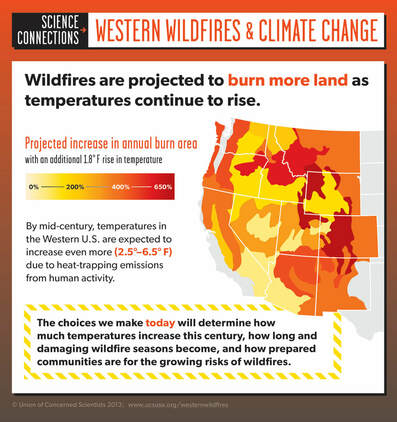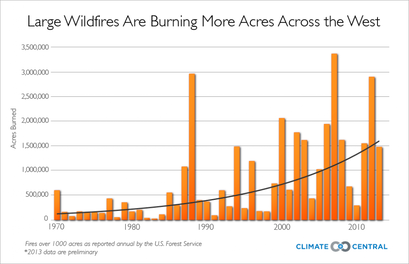 I don’t see how we can’t talk about climate change. The facts are overwhelming, the science is sound, and our wildland fire experiences validate both. Now, I get that the topic is uncomfortable and I certainly get that while not official policy, not saying much if anything about climate change is a preference that has been well communicated by the current administration. Obviously, it’s a political minefield and I’m not advocating climbing on top of the soapbox and preaching. Most of the time, I don’t think communicators on wildland fires or other disasters should bring it up. But neither should we shy away from discussing climate change when it is appropriate or when asked by the public, stakeholders, cooperators, or the media. As incident responders, we have the obligation to honestly confront reality and as true crisis communicators we have a responsibility to discuss that reality in a way that establishes competence and confidence. If we dance around the topic in an obvious fashion, we damage our standing and the public’s view of our expertise.  Climate change has reached the point where the politics are understood by most of the public. In a recent Gallup poll, 67% of Westerners think global warming is happening now. That's the highest of any region in the US. It seems counter-intuitive, but if we try to avoid it as a way to not get entangled in the politics, we will appear political in the sense that the public will immediately understand we are sidestepping the controversy instead of replying honestly. The next step will be to ask why we are failing to address the topic and none of the answers will reflect well upon our virtue. The best course for a crisis communicator is to address the issue in a straightforward manner. After all, changing conditions due to warming will be part of our lives well beyond 2020. It is unfortunate--and unfortunately, predictable--that NIFC’s 2019 National Fire Season Themes do not mention climate change. It is a wasted opportunity. The standard answer over the past few years has rightly been, “We can’t say climate change caused this fire, but it does seem to be creating conditions that lead to large fires.” Yet as changes accelerate, we need more guidance, more tools, more specificity and more flexibility. The last five years have done great damage to the old assumptions about fire season, fire weather, and fire behavior. As communicators, we should be bringing those changes to the forefront. We not only owe the public, but it is also a self-preservation exercise. The longer we allow the old assumptions to guide our thinking and influence our organization—including budget and personnel--the more difficult it will be to make the necessary changes fast enough to address the detrimental effects of climate change on our landscape and in our communities. We all know wildland fire activity across the western 48, Canada, and Alaska is not a simple problem. In recent decades, fires have been enabled by several factors, including the legacy of fire suppression, human settlement and distribution patterns, other management actions, and even natural climate variability. As important as those influences are, the signature of human-caused climate change is strengthening and overwhelming the rest. You can no longer explain our fire years (and smoke years) without climate change. Consider just these few data points:
Globally, the last five years have been the hottest that any human who ever walked the Earth has experienced. The odds are great that the last five years will also be the coolest period we will experience for the rest of our lives. Fires are moving out of the wildlands and more and more incidents are reaching those tens of lives and thousands of homes category. We simply can’t ignore climate change and we must discuss the links to wildland fires and other incidents we may find ourselves on. To bring it down to an incident level, there have been challenges in explaining indirect strategies on large fires. Folks often complain that we should just get in there and put it out because that’s what was done in the past. “Big box” has become an expletive in some circles. Yet some of that is of our own making. When we decline to communicate the climatic changes taking place and how that influences our strategies and drives safety concerns, we do a disservice to our communities because they will continue to apply those old assumptions that are no longer valid. I was chatting with an Ops Chief a couple of years ago who said if we fight fire now like we fought fire in the early 1990’s, we’d get a lot better at conducting memorial services. That notion gets truer every year. Our strategies and tactics are evolving while our safety processes become more exacting, and climate change is a big reason for it. Again, as crisis communicators, our responsibility is to those affected by the incident and those that will be affected in the future. One of the most important tasks we have on an incident is to help folks prepare for the next one. We cannot effectively provide that help if we don’t honestly address what we are seeing. And we certainly can't sacrifice our standing and hard-won reputation for fleeting political expediency. In sum, when it comes to climate change questions, just do the right thing. ___ JIM Copyright © Jim Whittington, 2018, All rights reserved. Academic use approved with notification and attribution.
2 Comments
1/30/2020 18:15:54
Today I am going to try my best to say only nice and uplifting things. Maybe it's true that nothing good ever comes out from being overly negative all the time. It's like learned helplessness already. Trying to extract glamour out of it will only leave both doers and spectators drained. It's pointless to dwell. It's always better to be proactive in finding permanent solutions to temporary difficulties.
Reply
6/28/2021 01:03:12
In recent years, the phrase "climate change" has received a lot of attention. It is not only having a negative impact on people's lives in the present but also threatening the living environment in the future.
Reply
Leave a Reply. |
Occasional thoughts on incident response, crisis communications, wildland fire, and other topics.
Docendo disco, scribendo cogito. Blog DOB: 4/26/2018Copyright © Jim Whittington, 2019. Archives
August 2019
Categories
All
|
 RSS Feed
RSS Feed